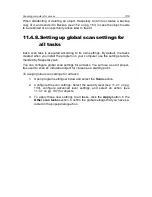
CHAPTER 11.
SCANNING
COMPUTERS FOR VIRUSES
One of the important aspects of protecting your computer is scanning user-
defined areas for viruses. Kaspersky Anti-Virus can scan individual items
– files,
folders, disks, removable devices
– or the entire computer. Scanning for viruses
stops malicious code which has gone undetected by real-time protection compo-
nents from spreading.
Kaspersky Anti-Virus includes the following default scan tasks:
Critical Areas
Scans all critical areas of the computer for viruses, including: system memo-
ry, programs loaded on startup, boot sectors on the hard drive, and the
Win-
dows
and
system32
system directories. The task aims to detect active virus-
es quickly on the system without fully scanning the computer.
My Computer
Scans for viruses on your computer with a thorough inspection of all disk
drives, memory, and files.
Startup Objects
Scans for viruses all programs loaded when the operating system boots.
Rootkit Scans (Rootkits)
Scans the computer for rootkits that hide malicious programs in the operat-
ing system. These utilities injected into system, hiding their presence and
the presence of processes, folders, and registry keys of any malicious pro-
grams described in the configuration of the rootkit.
The default settings for these tasks are the recommended ones. You can edit
these settings (see 11.4 on pg. 129) or create a schedule (see 6.6 on pg. 60) for
running tasks.
You also have the option of creating your own tasks (see 11.3 on pg. 128) and
creating a schedule for them. For example, you can schedule a scan task for
mailboxes once per week, or a virus scan task for the
My Documents
folder.
In addition, you can scan any object for viruses (for example, the hard drive
where programs and games are, e-mail databases that you've brought home
from work, an archive attached to an e-mail, etc.) without creating a special scan
task. You can select an object to scan from the Kaspersky Anti-Virus interface, or
















































